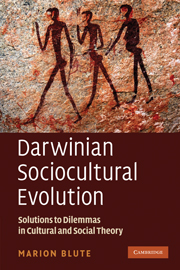Book contents
- Frontmatter
- Contents
- Preface: a postmodern metanarrative
- Acknowledgments
- 1 Introduction
- 2 History: where did something come from?
- 3 Necessity: why did it evolve?
- 4 Competition, conflict and cooperation: why and how do they interact socially?
- 5 The ideal and the material: the role of memes in evolutionary social science
- 6 Micro and macro I: the problem of agency
- 7 Micro and macro II: the problem of subjectivity
- 8 Micro and macro III: the evolution of complexity and the problem of social structure
- 9 Evolutionism and the future of the social sciences
- References
- Index
6 - Micro and macro I: the problem of agency
Published online by Cambridge University Press: 05 June 2012
- Frontmatter
- Contents
- Preface: a postmodern metanarrative
- Acknowledgments
- 1 Introduction
- 2 History: where did something come from?
- 3 Necessity: why did it evolve?
- 4 Competition, conflict and cooperation: why and how do they interact socially?
- 5 The ideal and the material: the role of memes in evolutionary social science
- 6 Micro and macro I: the problem of agency
- 7 Micro and macro II: the problem of subjectivity
- 8 Micro and macro III: the evolution of complexity and the problem of social structure
- 9 Evolutionism and the future of the social sciences
- References
- Index
Summary
THE PROBLEM OF AGENCY
The problem of the relationship between individuals and societies/cultures is an old one. Do the experiences and choices of individuals make societies and cultures or do societies and cultures structure and programme the behaviour of individuals? This dilemma was at the heart of the founding of the social sciences in the nineteenth century with economics, largely an English product, choosing the former and sociology and anthropology, largely products of continental Europe, choosing the latter. In the last quarter of the twentieth century, the prolific English sociologist Anthony Giddens (1976, 1979, 1984) dubbed this the problem of “agency” versus “structure” and the terminology has stuck – migrating beyond sociology into other social science disciplines such as institutional economics for example (Hodgson 2004).
The reader will notice, however, that this chapter is titled “The problem of agency” rather than that of agency vis ă vis social structure/culture. We already saw in Section 2.3 on history how Bandura showed that sociocultural processes in the form of social learning cannot be reduced to the psychological in the form of individual learning. We also saw in Section 5.6 on memes how they cannot be reduced to social psychological ones in the form of interacting individual learning either. The problem of agency, i.e. of individual action, needs to be addressed in its own right, however. That is because too often in many of the social sciences today it is implicitly assumed to be more or less a matter of free will.
- Type
- Chapter
- Information
- Darwinian Sociocultural EvolutionSolutions to Dilemmas in Cultural and Social Theory, pp. 138 - 161Publisher: Cambridge University PressPrint publication year: 2010

